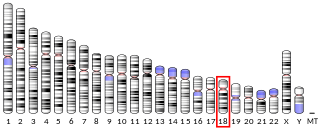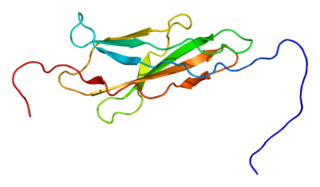
C-C chemokine receptor-like 2 is a protein that in humans is encoded by the CCRL2 gene. Recently it was found that CCRL2 also acts as a receptor for the chemokine chemerin.

ATP-binding cassette sub-family A member 2 is a protein that in humans is encoded by the ABCA2 gene.

Neuroligin-1 is a protein that in humans is encoded by the NLGN1 gene.

Neurexin-2-alpha is a protein that in humans is encoded by the NRXN2 gene.

Olfactory receptor 5AC2 is a protein that in humans is encoded by the OR5AC2 gene.

Olfactory receptor 5K2 is a protein that in humans is encoded by the OR5K2 gene.

Intraflagellar transport protein 88 homolog is a protein that is encoded by the IFT88 gene.

Probable cation-transporting ATPase 13A3 is an enzyme that in humans is encoded by the ATP13A3 gene.

Protein MON2 homolog is a protein that in humans is encoded by the MON2 gene.

Intraflagellar transport protein 57 homolog is a protein that in humans is encoded by the IFT57 gene.

Vacuolar protein sorting-associated protein 13D is a protein that in humans is encoded by the VPS13D gene.

Kinesin-like protein KIF17 is a protein that in humans is encoded by the KIF17 gene. KIF17 and its close relative, C. elegans OSM-3, are members of the kinesin-2 family of plus-end directed microtubule-based motor proteins. In contrast to heterotrimeric kinesin-2 motors, however, KIF17 and OSM-3 form distinct homodimeric complexes. Homodimeric kinesin-2 has been implicated in the transport of NMDA receptors along dendrites for delivery to the dendritic membrane, whereas both heterotrimeric and homodimeric kinesin-2 motors function cooperatively in anterograde intraflagellar transport (IFT) and cilium biogenesis.

Transcription factor HIVEP3 is a protein that in humans is encoded by the HIVEP3 gene.

Sperm flagellar protein 2 is a protein that in humans is encoded by the SPEF2 gene.

Intraflagellar transport protein 20 homolog is a protein that in humans is encoded by the IFT20 gene. The gene is composed of 6 exons and is located on human chromosome 17p11.1. This gene is expressed in human brain, lung, kidney and pancreas, and lower expression were also detected in human placenta, liver, thymus, prostate and testis.

Protein TRS85 homolog is a protein that in humans is encoded by the KIAA1012 gene.

Contactin-3 is a protein that in humans is encoded by the CNTN3 gene.

Protein sidekick-2 is a protein that in humans is encoded by the SDK2 gene.

Intraflagellar transport protein 81 homolog is a protein that in humans is encoded by the IFT81 gene. Together with IFT74/72 it forms a core complex to build IFT particles which are required for cilium formation. Additionally, it interacts with basal body components as CEP170 which regulates the disassembly of the cilium.

Intraflagellar transport protein 74 homolog (IFT74), also known as coiled-coil domain-containing protein 2 (CCDC2) and capillary morphogenesis gene 1 protein (CMG1), is a protein that in humans is encoded by the IFT74 gene.














